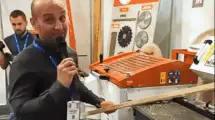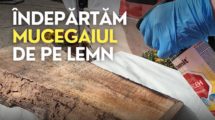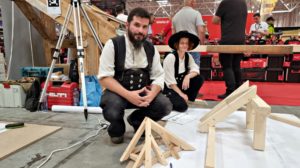The first meeting with Christian Rummel was in 2019 at Naturalpaint Workshop from Cisnădioara. The possibility to learn about wood fiber insulation directly from Gutex specialists made him come with his apprentice. His curiosity and involvement was attention-grabbing and made you want to know his story. There wasn't time then to talk more, but ... in 2022, I met him again, at NZEB Week in Clujas an exhibitor. We had time to talk more and learned that he is a master carpenter and has participated in numerous restorations of monuments. The density of the event left us no time for life stories, but we promised to meet up soon. A job in Bucharest was the perfect opportunity for a long-awaited reunion. He greeted us in his typical work attire of flared pants, white blouse and vest. We sat quietly while he told us stories about the beginning of woodworking, initiatory journeys, coming to Romania and his continuing desire to pass on what he has learned.

When I was 7, when others were getting who knows what plastic toy, I got a chisel
Christian is German from Bavaria and now lives in Romania. He is a master carpenter, specializing in stairs, framework and restoration. Wood has been part of his life since he was a child. One of his childhood presents was a chisel which he still has. He has developed as a professional woodworker in the German woodworking culture, learning both theoretically and practically.
From the age of 14, he spent his Saturdays and vacations working as an apprentice at a nearby carpentry shop as an apprentice to the carpenters. In this way he helped to build timber frames and even wooden houses. At the age of 16 he began his studies at the vocational school and for 3 years he specialized in wooden stairs. After graduation, he went on the traditional journey of the horses which lasted another 3 years.
"You can't just do this trip, you have to follow certain rules. You must have no bank debts, no criminal record, you can't be married or have children. You can't leave anyone behind, you must have no obligations. For 3 years you travel to learn and improve your skills and during this time you are not allowed to have a car or cell phone. You're not allowed to return home for the whole period and you're not allowed to live within 50 kilometers of home."
His traditional travels have taken him to countries in Europe and South America with carpentry and joinery work. He has worked in Switzerland, France, Scandinavia, Italy, Bolivia, Argentina, Peru. He had the opportunity to see the differences in the way of building, to study particularities, to learn secrets. He first came to Romania in 2007 and returned in 2008.
After this trip, he took a restoration course. One of his teachers told him about a social project in Mediaș and asked if he wanted to get involved. He agreed and at the age of 25, he arrived back in Romania, but this time with ties to our country.
Restoration projects and workshops combined with your own stair and carpentry firm
The project for which she came to Mediaș was aimed at children who wanted to learn a trade. Parallel to this project he opened his own workshop and started to do various works. He has been involved in important restoration projects, helped to save UNESCO protected historical monuments such as church in Biertan. It has clients and private individuals who renovate or refurbish old houses.
From the way he talks about restoration projects, you can tell he is passionate about the subject and knows a lot about carpentry and joinery. He manages to combine very well modern methods of design and determining the age of the work precisely because he knows and appreciates the way of working in the past.
"If you've never chopped beams with an axe, you don't know what it means and you don't appreciate it. But if you know how they once worked then you appreciate it, you don't destroy and you don't cut and throw away a piece of beam unless it's impossible to salvage. Then you replace and find reversible and resilient solutions that fit perfectly. And the added part needs to show, you don't hide it. It's also your pride that you made that piece of work fit perfectly, that you helped save it."
He believes that education is extremely necessary and it is important to know a trade well. During all this time, Christian has tried at every opportunity to pass on his knowledge of wood and the craft, lecturing and training those interested. He has taught volunteers on various restoration sites about wood and wood salvage, he has lectured to employees of construction companies. He would have liked to bring initiatives together, to do more for vocational education, but to succeed requires involvement from many directions. Even though he has been invited by representatives of the Ministry of Education to sit on various attestation committees.

Back to school in Germany, both as a pupil and a teacher
In 2021 he thought it was time to go back to school again. He learned about building strength, design software, and became a master carpenter with signature rights.
"In Germany, a master carpenter is the equivalent of an architect or construction engineer. He has the right to sign documents on file for various permits such as building permits, for example. He can also do strength calculations."
Since 2022 he has been teaching at a master carpentry school based in Konstanz (Bodensee) and workshops in Bavaria. He travels back and forth between Romania and Germany to teach students about the strength of framing, timber construction, modern design software and how to draw by hand. He says this is the basis, if you don't know how to draw by hand, it will be hard to learn the software. That's why the final exam is also based on hand drawing.
Dual education is needed. You have to learn the job both in theory and in practice
Christian's regret is that there is no dual education in Romania, there is no link between theory and practice. Vocational schools no longer exist, there is no real carpenters' guild and there is a lack of institutions to represent the trades. Hence the lack of craftsmen, specialists and standards. Standards that should be imposed by the institutions representing the trades because they know best how a job should be done. Now these standards are imposed by the ministry through the implementing rules.
We talked a lot with Christian, our discussion touching and developing various topics. The full interview will appear soon on the youtube Wooden magazine.




































Add comment